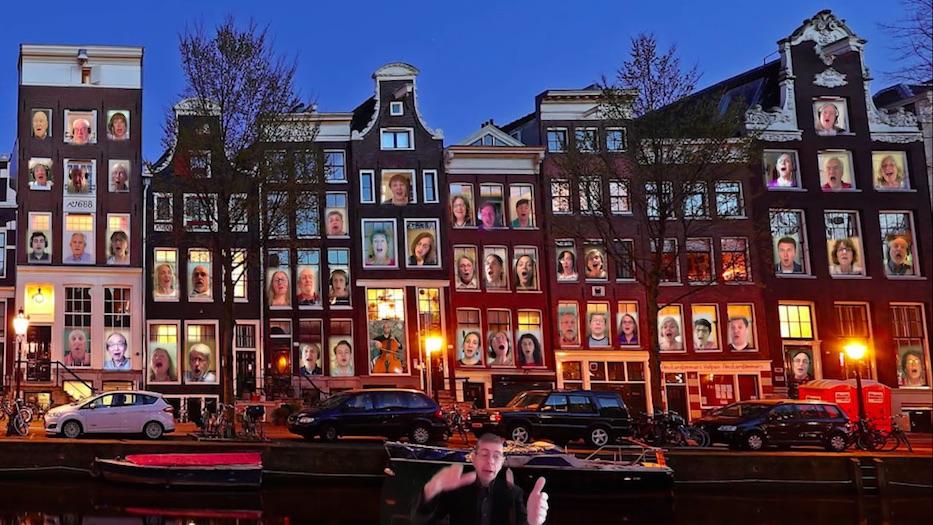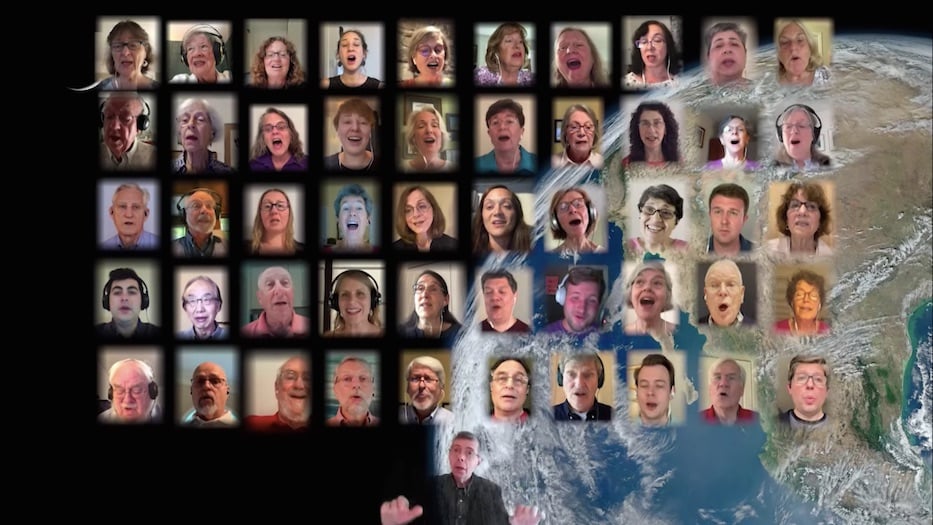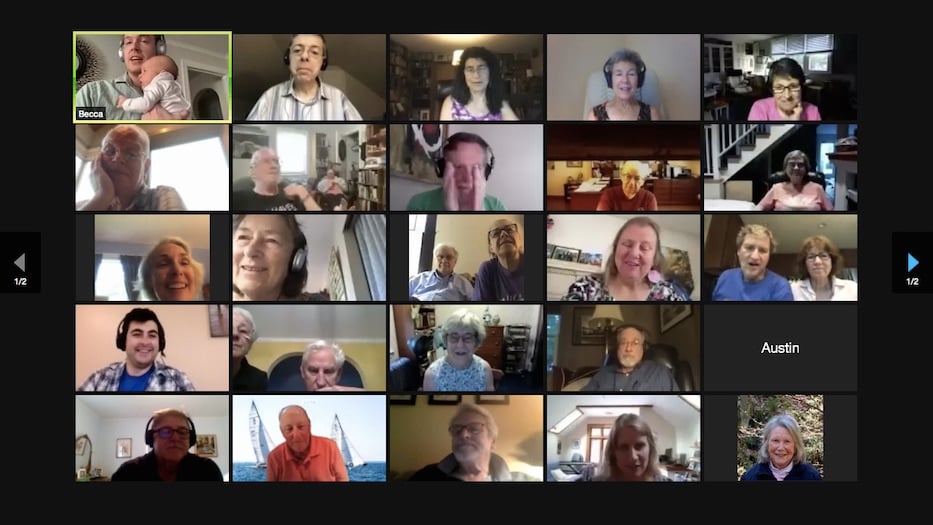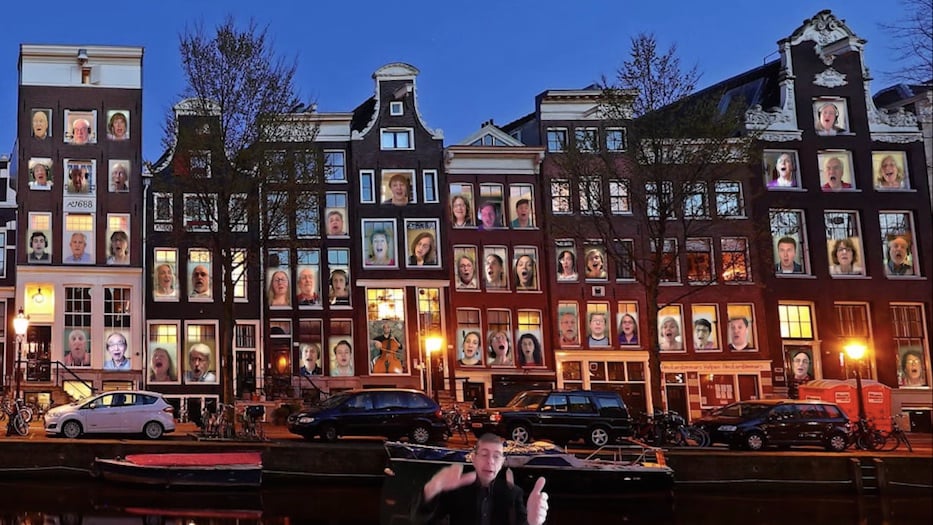
Music | Arts & Culture | COVID-19 | New Haven Chorale

A screenshot from "We Sing Because."
The video starts with a ticking watch, the second hand whisper-thin and methodical as it sprints forward. The piano comes in clear, succinct and persistent. A cello sings beneath it, and then disappears. The scene shifts: a needle points northward on a compass that turns at a dizzying pace. An ocean of voices rises, slowly.
I have lost my way, members of the New Haven Chorale sing. I miss my students.
I have lost my bearings/We are thankful for family/And friends.
Colin Britt’s “We Sing Because” is the latest way the New Haven Chorale has continued to make music virtually during the Covid-19 pandemic. When it returns to in-person auditions later this month, it will be the first time in over 15 months that members have a chance to hear each other and new vocalists perform in person.
Auditions for the group are scheduled for Thursday Aug 26 from 6 to 9 p.m. and Saturday, Aug. 28 from 11 a.m. to 2 p.m. at the Unitarian Society of New Haven. The organization is currently seeking all parts; information is available at the chorale’s website. Alice Hummel, executive director of the organization, said that the chorale has asked singers who are not vaccinated not to come.
“In our lifetimes, we’ve never had a more isolating event,” said Alan Kliger, a clinical professor of medicine at the Yale School of Medicine and a tenor with the chorale. “It was really frightening how isolating it was. This vehicle of being able to be together is so important.”
When the pandemic hit last year, the Chorale was preparing for its 70th anniversary concert, which it cancelled by late March. As choirs across the country pivoted—and some went on temporary hiatus—the group took its work online. In a matter of weeks, members were singing again on mute, as they shared a grid of one-inch boxes on a Zoom screen.
At the time, said Choral Director Edward Bolkovac, none of them had any idea how long the pandemic would last. When Covid-19 began, choirs were some of the first casualties of Covid-19. A now-infamous rehearsal in Skagit County, Washington turned deadly when one Covid-positive singer infected 52 others, including two who ultimately died.
Back in Connecticut, other regional choirs including the CT Gay Men’s Chorus and the Greater New Haven Community Chorus also went virtual. It made sense to keep singing, muted microphones and all.
As members gathered faithfully online, Bolkovac watched the group become a support system. Singers checked in with each other, struggling as much with mental health and isolation as they were with their daily phonation exercises. They shared life updates, introduced new babies, and started rehearsing for and releasing virtual videos.
Some, including former members, logged on to the chorale from California, Massachusetts, and Rhode Island. In June of this year, several worked to support member Linda Pawelek, whose husband died of a sudden heart attack at the end of May.
“I feel loved and I’m very grateful,” Pawelek said in the final rehearsal of the season.
In addition to sending out music, Bolkovac added a whole-body social and emotional wellness component to the chorale’s focus on technique. At a recent rehearsal on Zoom, he gave members time to check in with each other before jiggling feet, rolling necks and head-to-toe stretching filled the frame.
His voice was gentle as he counted in neck exercises, heads rotating across the screen. Only after members have completed a physical warmup does he move into jaw exercises and vocal warmups and work.
“And if that’s all you can do, do it. Use it while you can,” he said with the even cadence of a yoga instructor as heads and necks rotated on screen. “If your body says don’t go further, then just don’t.”

The chorale's final rehearsal before a short summer vacation. Screenshot via Zoom.
In over a year on Zoom, he has learned to lead exercises with vocalists on mute, singing in their bedrooms, kitchens, dens and living rooms. In a ritual that is both bizarre and now routine, he conducts vocalists as if they are in rehearsal, greeted by the quiet of five dozen silenced microphones. He tends to wave his hands, pull up recordings and sheet music, and demonstrate exercises just the same.
At the organization’s final rehearsal of the season in June, he spoke to a screen full of faces, his voice bouncing across it. He pressed his face close to the screen, lips and teeth visible. He had members breathe in and out in unison, reminding them not to force anything.
“First of all, imagine everybody here online with us right now, and send up positive energy to anybody here,” he said. “Send up positive energy to Linda, and to anyone else in the group who needs that energy and focus. And now, have that light just keep emanating outward.
“Think of your family, wherever they are, to your friends, close by and far away, send out energy to everybody in the town you’re in, to the county, to the region of the country, to the entire country … your energy just keeps spreading across the oceans on both sides,” he continued. “Head to Russia. Head to China. The Pacific Rim. See the earth as a globe out there in space, and keep sending out your positive energy.”
Before going on hiatus for the summer, Bolkovac also opened a sort of 2020 time capsule, reminding the group of where it had been with some of its earlier virtual recordings. Members listened online with closed eyes, some smiling and others bobbing their heads as if they were humming along.
That sense of being together, apart is one of the things that led Bolkovac, Hummel and members of the chorale to commission and record “Because We Sing,” an original composition based on listening sessions with the group. Earlier this year, members spoke openly with Britt about the moments and people they miss, from grandchildren to spouses and elders that are no longer with them.

Most, if not all, also spoke about the solace that music making has brought them. Many have been with the group for at least a decade, and some joined in the 1980s and 1990s—meaning that there’s a sense of extended family on every Zoom call. Britt then took those interviews, and folded them into a piece.
In the finished composition, a persistent, mournful strike of the piano and ribbon of cello play the musicians in. As their voices crest over the music, it’s hard not to be overcome with emotion thinking of everything these small, singing faces have lost—and listeners, inevitably, have too.
“It has been an amazing experience to see this group stay together and work together through the most horrific conditions,” Hummel said.
In an interview after a recent rehearsal, members said that the chorale became a lifeline as they were physically cut off from their family members, children and grandchildren, and friends last year. Sue Leonard, who has been part of the group for 25 years (“I’m new compared to some of the other members,” she laughed), missed her sons and grandsons. Sally Tremaine recalled being suddenly "cut off" from her grandkids, who she'd babysat for the first five years of their lives.
“This community is the only community where I have felt connected,” said Terry Bennett, who joined 17 years ago.
Others praised the guided meditation, which Bolkovac said he thinks of as simply an exercise to get into a rehearsal-ready mindset. Board President Linda Waldman, who retired from her work in medicine a few years ago, said it grounded her when she was serving as the house’s grocery shopper and was “absolutely terrified” in the early days of the pandemic. Giovanni Esposito, a chemist who works in a science lab, said it calmed him as he continued going into work.
“We really are a community,” Waldman said.
Zooming in from the city’s Edgewood neighborhood, artist Elida Paiz Pineda said she was grateful for the group in a 16-month period that has otherwise been turned on its head. Last year, Pineda caught Covid-19 while working in a grocery store. After hearing about the choir’s work online, she joined last fall.
“I thought, ‘If I can’t do something else, at least I can sing,’” she said. “It was such a meaningful thing … so touching and so healing.”
She pointed to the chorale’s virtual performance of Gerald Custer’s “Innisfree,” which was released in late February of this year. The sheer beauty of the song overcame her as she practiced it and recorded her part.
“It’s been like a home,” she said. “It’s been like a home. It has challenged me and forced me to grow as a singer. I’ve never been in a music group so dedicated to craft.”
After in-person auditions (the choir will do virtual if requested), Hummel said the group hopes to return to in-person rehearsal with extra cautionary measures in place. The highly infectious Delta variant had made planning more difficult: cases were far lower earlier this summer, and have since spiked across the region.
“The commitment of this group has been phenomenal,” Hummel said. “Faced with the fact that they were not going to be able to perform live, this chorale not only gave of itself, it also came together. “When you think about the community and the fact that we’ve been doing this for over a year ... it’s amazing.”
Auditions for the New Haven Chorale are scheduled for Thursday Aug 26 from 6 to 9 p.m. and Saturday, Aug. 28 from 11 a.m. to 2 p.m. at the Unitarian Society of New Haven. For more, visit the group's website.

